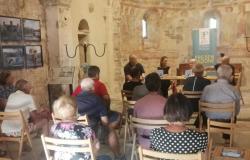
The new volume that Goffredo Palmerini offers readers, I’ll tell you like thisOne Group Editions, it’s like a piece of a large puzzle that the Abruzzo writer has been designing for some time. His fifteenth book stands out for the author’s usual, consummate, remarkable ability to keep together what happens in his homeland and the boundless horizons that open up beyond his city, The Eagle.
Ability that combines well with an empathetic vision strongly present in his articles, with an affectionate attention to detail, with an overall vision that is always present but never suffocating.
“I’ll tell you like this” it is a journey suspended between everyday life in L’Aquila, cultural encounters of the highest level, and compelling reflections on the different realities of Italian emigration. Thus we can read the affectionate memory of the great playwright from L’Aquila and New Yorker by adoption, Mario Frattiand to be projected into a reality substantiated by the highest literature that never forgets the concreteness of everyday life and, at the same time, a few pages later, to find the description of events with a highly symbolic and aggregative meaning such as the Columbus day of the Big Apple.
A book, therefore, with great cognitive and emotional value. The author’s long association with both our communities scattered around the world and some of the most representative names of contemporary culture – read the lines dedicated to the great Lebanese poet Hafez Haidar -, and the realities of his native region, give the book a cultural and almost “psychological” openness, necessary in a time of closures and prejudices like ours.
“I’ll tell you like this” it can be savored calmly, in small steps, without haste, because the author’s writing is a writing coming from a calm, understanding, affectionate gaze, never over the top. It is a writing that invites calm reflection, but no less attentive to the less commendable sides of reality: Palmerini he does not judge harshly, but brings out the different sides of the people, issues and events narrated, leaving the reader the freedom of judgement.
However, his city is always present above all, The Eagleto which, as Italian Capital of Culture 2026, the book is dedicated. It is from L’Aquila that Palmerini weaves the dense web of encounters throughout the world and its task of Ambassador of Abruzzo it is never just an empty charge for a sterile preening, but it is the starting point for meetings, reflections, experiences of which this book is a succulent fruit and highly advisable for our troubled times. Enjoy the reading!





